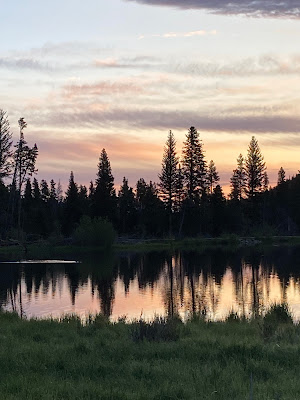"The degree to which you can tell your story is the degree to which you can heal."~S. Eldredge
Sunday, June 25, 2023
submersed
Monday, June 19, 2023
why we wander and where we go
.jpg) |
Monday, June 5, 2023
"the mind illuminated"
I'll be off the grid, so to speak, for the next week or so...heading out to Estes, Colorado to explore the park with a few of my favorite people. This is the reward I promised my new right knee if she kept up with her PT and proved she could hike a bit without complaining about it. She's eager to see if she measures up, and so am I. Of course, there are some activities we will have to pass on, like rock climbing and white water rafting...
...meaning I will need a couple of good books to enjoy poolside while the younger generation puts their lives at risk.
Monday, May 29, 2023
when the truth is pure fiction
Tuesday, May 23, 2023
the difference between caring for our patients and caring about them
The motivating principle behind the practice of narrative medicine is the conviction that, in clinical medicine, storytelling is a healing practice. The concept of training health care professionals in narrative medicine originated under the direction of Rita Charon, M.D. at Columbia University. She recognized the fact that patients need to be encouraged to tell their whole story in order for the clinician to come to an accurate diagnosis and to develop an effective treatment plan. A complete medical history reveals not just what symptoms patients are experiencing, but how their illness affects them emotionally, how it impacts the people they love and care for, what fears they harbor, and what expectations they hold.
Sunday, May 14, 2023
the happiest day of the year...or the saddest
A couple of years ago, a childless friend of mine stopped me after Mass on Mother's Day. She confided to me about how sad she was because she couldn't stand up in church to receive the special Mother's Day blessing.
So...this post is for her, and for YOU...if you are a mother or hope to become a mother some day.This is for you is you have lost a child through illness or injury, an act of gun violence...or, God forbid, because of a drug overdose or by suicide.
If you are a mother who has been entrusted with the care of a child with special needs, this is for you.
If you have suffered a miscarriage...or opted for an abortion...this is for you, too.
If you are estranged from your children...if you wish you had done better...if your maternal heart is broken, this is definitely for you.
If you are trying to do it alone, this is for you.
If you are a woman, this post is for the comfort, encouragement, patience, kindness, and love you have shown for any child, anywhere, ever...
It's for the frustration, worry, sorrow, anger, and sacrifice you have borne just trying...because Mother's Day may be the happiest day of the year for you...or the saddest.
| www.scientificchicago.com |
Tuesday, May 9, 2023
protect kids, not guns
Here are the facts:
Interestingly, right-leaning politicians and their supporters who understand and defend the right to life of the unborn apparently do not apply the same standard to toddlers, preschoolers, or school age children. They don't seem to understand the connection between easy, and often illegal, access to firearms and the loss of young lives. Instead of citing the role of firearms in these deaths, they assign blame elsewhere. They place responsibility on a failed mental health system, or with lawless immigrants. And they can't be convinced otherwise.
Which leaves us in a bind. Those of us who recognize the horror and the urgency of this crisis feel an aching imperative to act. A sacred duty to act. But...what can we do? Our leaders have nothing to suggest. Our priests and pastors have nothing to add. We are left with little more than wishful thinking.
Death by gunshot is an agonizing process. Imagine it. Go ahead. Try. Imagine the bullet tearing through your flesh, into your lung, or your gut, or your brain. Bleeding out. Suffocating for lack of oxygen. Now take a moment to imagine your child or grandchild suffering like that. No...no, you can't. It is unthinkable. Unbearable. Impossible.
Unless you are able to somehow acquiesce to the loss of your own child's life by gunshot, you must take a stand against it no matter which side of the political spectrum you favor. You must speak out. You must act to pass strict gun control laws. To disempower the NRA. To prioritize mental health services. You must put your own guns down. To ignore or deny or vindicate this problem is to invite disaster into your own life and the lives of those you love.


.jpg)
.jpg)


.JPG)



.JPG)

.JPG)